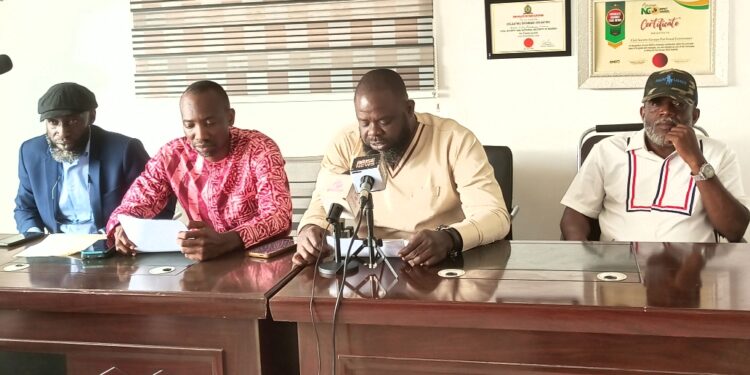A Coalition of Civil Society Organisations, have accused an NGO named, Concerned Citizens on Economic Reform Nigeria, of impersonating them and called on security agencies to arrest and prosecute the culprits.
The Convener of Initiative for Leadership and Economic Watch, Splendour Agbonkpolor, made this known while addressing newsmen on Monday in Abuja.
Agbonkpolor said the call was in reaction to a petition written by the said NGO to the Unites States Department of Treasury Office of Foreign Assets Control (OFAC) through the U.S Embassy in Abuja.
He added that the said petition was signed by one Tijani Ibrahim m, who claimed to be the Convener and Amb. Fatima Abubakar, as the Secretary of the said NGO.
According to him, the petition titled ‘Persons of interest in the violation of the coalition-agreed price cap on Russian crude’ was against the Group Chief Executive Officer, Nigeria National Petroleum Company Limited, Mele Kyari and Chief Executive Officer, Matrix Energy group, Abdulkabir Aliu.
Agbonkpolor said the coalition was inundated with calls from well-meaning Nigerians on the fact that the office address listed on the group letterhead belongs to the coalition.
He added that the name used by the group was also twisted to look like one of theirs.
“The name of the convener also happens to be assumed to be one of us since we have such a name in our coalition.
“Gentlemen, we have gathered you here to denounce the letter written to the US government and to state categorically that we were impersonated by those who wrote it.
“For the records, the NGO who wrote it in disguise of one of ours is not registered with the Corporate Affairs Commission.
“Secondly, the two phone numbers used in their letterhead do not exist anywhere but created out of their memories.
“Most importantly, the address listed there as Suite B5, 3rd Floor, Danville Plaza, No 5, David Ejoor Crescent, Abuja is currently unoccupied.
“We all occupied various sections of Danville Plaza for over ten years as NGOs but last year December, the owner of the place sold it and we all moved to new place.
“As NGOs, we do not subscribe to blackmail and will not sit back and watch people impersonate organisations we have built credibly for years in order to make us look like enemies of a well-meaning Nigeria state.
“Anyone who has an axe to grind with NNPCL and its management as well as the Matrix Energy Group should be bold to use their registered NGO as well as address and not ours,” he said.
Agbonkpolor urged the U.S. government to disregard the petition submitted by the group, saying it was not authored by any of the members of the coalition who were former occupants of the address used by the said group.
He said the coalition found it distasteful to be used by any group of persons or companies fighting for their own interests.
Axcordimg to him, they will be proceeding to submit a letter of of withdrawal to the U.S. Departinent of the Treasury Office of Foreign Assets Control (OFAC) through its United States, Embassy in Abuja on this issue that is almost eroding our integrity, credibility and reputation.
Also, the Convener of Social, Political, Economic, Educational and Environmental Rights Initiative (SPEEERI), Jacob Okpanachi, called on the security agencies to expose the persons behind the petition and bring them to book.
Okpanachi said the group would not allow any group of persons to tarnish the credible image they had build over the years. (NAN)











